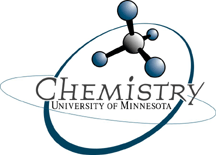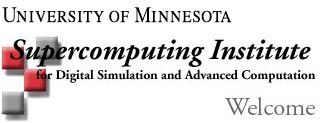
|
#ChemCoach Entry / Chris Cramer October 23, 2012 |

|
Your current job: Well, Lord, my title's a jaw-cracker just now, to be honest, but, in its full glory, that would be: Elmore H. Northey, Distinguished McKnight, and University Teaching Professor of Chemistry, Chemical Physics, and Scientific Computation at the University of Minnesota. But, this year, that's only 50% of my appointment -- the Provost has also asked me to spend 50% of my time, with no title whatsoever (phew), working to align and energize the University's efforts in digitally enhanced and online learning initiatives. (Side note to anyone facing a question about a 50:50 appointment: prepare yourself for what is actually a 75:75 commitment).
What you do in a standard work day: Ha, ha. One of the reasons that I love my job is that there is no standard work day! But, on any given day, I may be preparing or delivering course content to students (undergrad or grad or both), or engaging in supported (or unsupported) research activities (and note that if the research involves grad students, it is entirely inseparable from teaching), or participating in some sort of public engagement exercise (e.g., tweeting, writing for public consumption, giving pedagogical or research seminars all over the world (but preferably really, really nice places!), etc.) I am also quite active in faculty and University governance at Minnesota, which involves substantial involvement with institutional policy and activities. And, I edit for two professional journals (for one of which I am Editor in Chief). And, I do consulting work for various mostly for-profit companies as allowed under University policy. Mind you, I guess I could have kept this paragraph short. My goal for a standard work day is "to educate".
What kind of schooling / training / experience helped you get there?: Loved science in high school, majored in math and chemistry at Washington University in St. Louis, got my Ph. D. with Scott Denmark (synthetic and mechanistic organic) at the University of Illinois. Somewhat less typical C.V. filler is that I paid for my undergrad with an Army ROTC scholarship, so after my Ph.D. I spent 4.5 years as an active duty Army officer (left as a Captain) including experience as an operations officer in Korea, a researcher at Aberdeen Proving Ground in Maryland, and a combat assignment in Southwest Asia during Operations Desert Shield and Storm. I don't think I can overstate how much I learned in the military that has served me well in academia (no, no -- not the hand-to-hand combat stuff...) Grad school teaches precisely zero about personnel management (unless you count the opportunity to observe bad examples as training...) but much of being a productive faculty member can be attributed to successful team building and leadership (and the rest is mostly time management, which the military teaches reasonably well, too). Of course, a brilliant idea every now and again helps as well.
How does chemistry inform your work?: Well, let's not dwell on the obvious parts about being a Chemistry professor. If I think of some of my other activities, Chemistry taught me how to write in tight, informative sentences (at least for venues more formal than this carnival, where I'm adopting a more conversational tone...) Chemistry taught me how to have a plan before embarking on a big, new project (set up the glassware and assemble the reagents the day before so you're all ready the next morning kinda thing). Chemistry keeps me skeptical about hot new trends (eye-roll while muttering the word "MOOC") until hard evidence accumulates to convince me.
Finally, a unique, interesting, or funny anecdote about your career: Sure, my best one is from undergrad days. Without going into a long preamble, suffice it to say that after a significant ignition noise, with accompanying burst of flames, and subsequent whooshing of CO2 extinguishers, my undergraduate research advisor, C. David Gutsche, was drawn into the lab to find me standing at the sink holding a 3-neck 2 L roundbottom that was blackened and opaque (but at least in one piece!) He leaned over to inspect the situation closely as I stood frozen, then he leaned back and said, "Chris, like many an undergraduate, you have mistaken the well tared flask for the well tarred flask." and then he walked out. Class. I've never forgotten. Of course, over the course of my professional career, I've also somehow progressed from organic synthesis to theoretical chemistry, but whether that's funny or not depends on where you stand. Save that story for another day, someday.